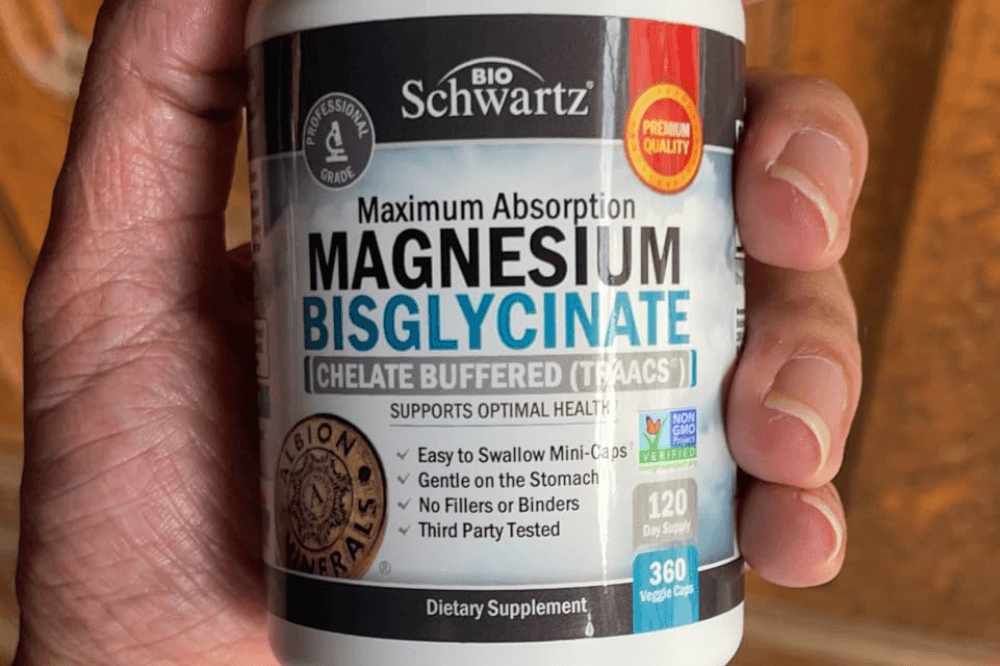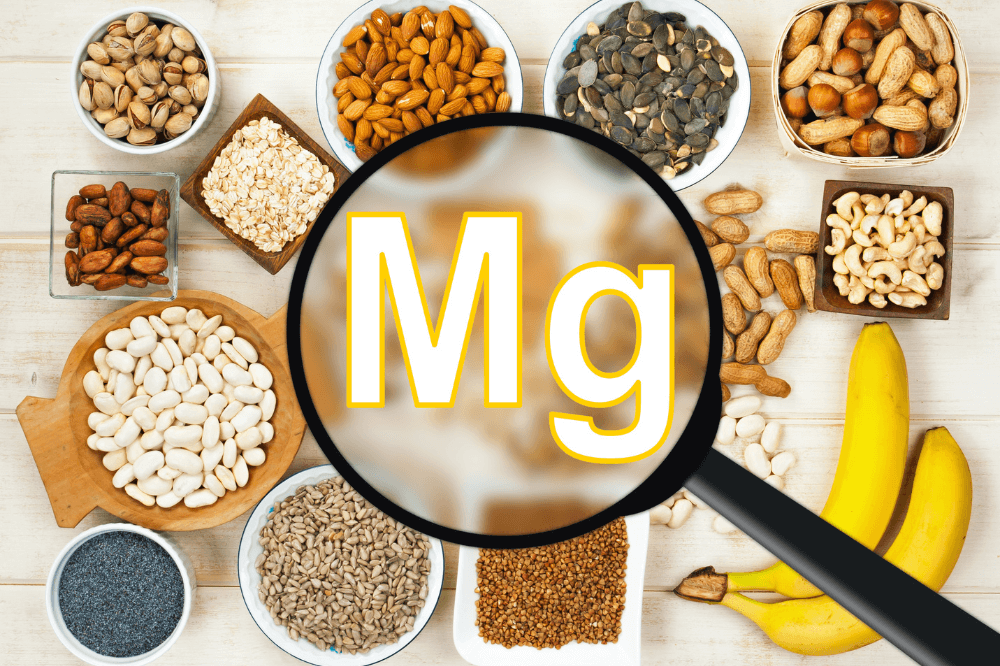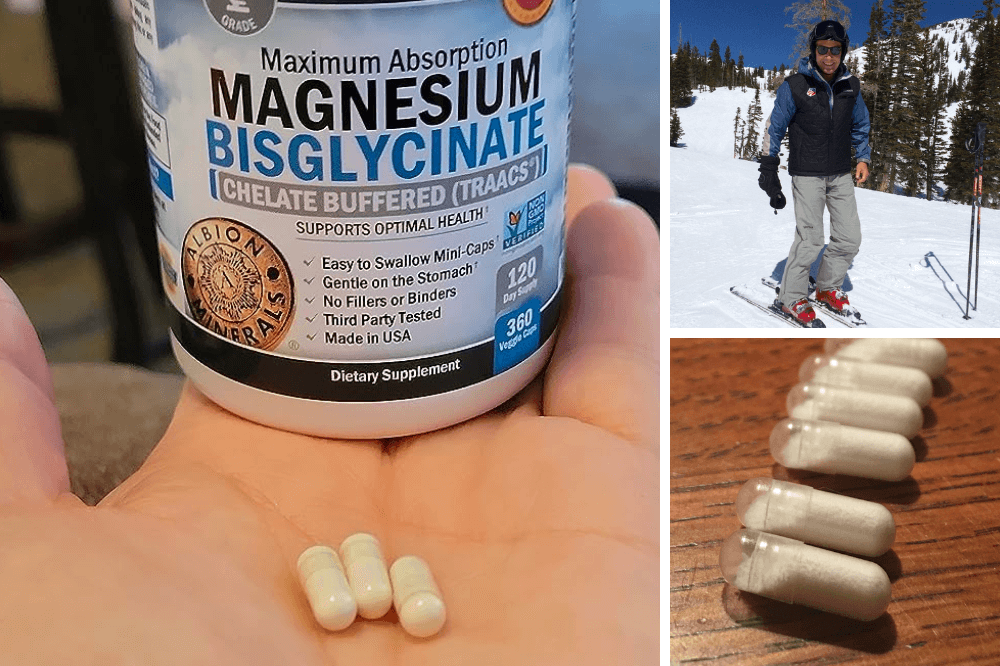Magnesium plays a critical role in over 300 biochemical reactions in the body, and many people don't get enough from their diet. One highly bioavailable form of this essential mineral is magnesium bisglycinate chelate, known for its numerous health benefits and better absorption rate.

What is Magnesium Bisglycinate Chelate?
Magnesium bisglycinate chelate is a form of magnesium supplement where magnesium is bonded to glycine, an amino acid. This chelated form enhances its absorption in the digestive system, making it one of the most bioavailable types of magnesium. Unlike other forms, such as magnesium oxide, citrate or magnesium glycinate, magnesium bisglycinate chelate is gentler on the stomach and less likely to cause laxative effects.

How Magnesium Bisglycinate Chelate Works
Magnesium bisglycinate chelate is a highly bioavailable form of magnesium that works by binding elemental magnesium to two molecules of the amino acid glycine. This chelation process significantly enhances the absorption and utilization of magnesium in the body. When you take magnesium bisglycinate chelate orally, it is easily absorbed in the small intestine and then transported to cells throughout your body, where it performs various essential functions. The glycine component of the chelate not only aids in absorption but also has a calming effect on the nervous system, helping to reduce anxiety and promote relaxation. This dual action makes magnesium bisglycinate chelate an excellent choice for those looking to maximize their magnesium intake and enjoy its full range of benefits.
Why Magnesium is Important for Your Body
Magnesium is an essential mineral necessary for many functions in the human body, including muscle function, nervous system regulation, and energy production. A deficiency in magnesium can lead to various health problems, such as muscle cramps, irregular heart rhythm, and weakened bones. Magnesium intake is also crucial for maintaining normal blood pressure, promoting bone health, and supporting blood sugar regulation.
Health Benefits of Magnesium Bisglycinate Chelate
Magnesium bisglycinate chelate has a number of health benefits, making it a popular choice among dietary supplements. Magnesium glycinate may offer various health benefits, including support for anxiety, bone health, and blood sugar management. Here's what it can do for you:
- Promotes Better Sleep Quality: Magnesium is known for its calming effect on the nervous system, helping you relax and improve your sleep. Supplementing with magnesium can support better sleep quality.
- Supports Bone Health: By contributing to calcium metabolism, magnesium is essential for bone health. It helps maintain strong bones, reducing the risk of fractures.
- Improves Blood Sugar Management: Magnesium is vital in maintaining insulin sensitivity, which can help manage blood sugar levels, particularly in people with diabetes or inflammatory bowel disease (IBD).
- Reduces Anxiety and Stress: One of the standout benefits of magnesium bisglycinate chelate is its ability to reduce anxiety. This form of magnesium helps balance neurotransmitters, which can have a calming effect on your mind and body.
- Supports Cardiovascular Health: Magnesium is crucial for blood pressure regulation and maintaining a healthy heart rhythm. Adequate magnesium levels can lower the risk of cardiovascular diseases such as high blood pressure and stroke.

How Magnesium Deficiency Affects Your Health
Many people, particularly in the United States, fail to get enough magnesium through diet alone. Magnesium deficiency can result from several factors, including poor dietary choices, alcohol consumption, and certain medical conditions like inflammatory bowel disease. It is important to know about magnesium glycinate, a well-tolerated and easily absorbed supplement that can aid those with deficiencies, especially individuals with conditions affecting magnesium levels, such as diabetes and inflammatory bowel disease (IBD). Some common symptoms of magnesium deficiency include:
- Muscle cramps
- Fatigue
- Nausea
- Anxiety
- High blood pressure
Increasing dietary magnesium intake through supplements like magnesium bisglycinate chelate can help alleviate these symptoms.
Who Can Benefit from Magnesium Bisglycinate Chelate?
Magnesium bisglycinate chelate can be a game-changer for a wide range of individuals looking to support their overall health and wellness. This supplement is particularly beneficial for people who:
- Have a magnesium deficiency or insufficiency, which can manifest as muscle cramps, fatigue, or irritability.
- Experience anxiety, stress, or insomnia, as magnesium bisglycinate chelate can help promote relaxation and improve sleep quality.
- Suffer from muscle cramps, spasms, or weakness, providing relief and improving muscle function.
- Have osteoporosis or osteopenia, as magnesium plays a crucial role in bone health.
- Deal with high blood pressure or cardiovascular disease, helping to regulate blood pressure and support heart health.
- Are physically active or engage in strenuous exercise, aiding in muscle recovery and reducing the risk of cramps.
- Have inflammatory bowel disease (IBD) or other gastrointestinal disorders, which can impair magnesium absorption from food.

Dietary Sources of Magnesium
Before turning to supplements, it's helpful to know about dietary sources of magnesium. Magnesium-rich foods include:
- Green leafy vegetables like spinach and kale
- Beans, lentils, and chickpeas
- Nuts and seeds
- Whole grains
- Avocados
Eating a diet rich in these foods can help ensure you get enough magnesium.

How Much Magnesium Should You Take?
The Recommended Dietary Allowance (RDA) for magnesium varies depending on age, gender, and health status. Generally, adults need between 310 and 420 mg of magnesium daily. The amount of magnesium in magnesium bisglycinate chelate varies based on the brand, but it's important to note how much elemental magnesium each supplement contains.
Should You Take Magnesium Glycinate Every Day?
Taking magnesium glycinate supplements daily is generally considered safe, especially since this form of magnesium is less likely to cause digestive upset. It is highly recommended for people who struggle with muscle cramps, high blood pressure, or low magnesium levels due to medical conditions like diabetes or IBD.
Magnesium Bisglycinate Chelate vs. Other Magnesium Forms
Many different forms of magnesium are available, including magnesium citrate, magnesium chloride, and magnesium sulfate. Magnesium supplements are generally safe and effective for daily use, but it is important to consult a healthcare provider before starting supplementation due to potential interactions and side effects. However, not all forms are created equal in terms of absorption and side effects.
- Magnesium Citrate: This form has a high absorption rate but can act as a laxative. It's often used to treat constipation.
- Magnesium Glycinate: Known for being gentle on the stomach, it is ideal for long-term use without the risk of diarrhea.
- Magnesium Oxide: This form is less bioavailable and often used as a laxative due to its strong effect on the digestive system.
For those looking to avoid digestive discomfort and get the most from their supplement, magnesium bisglycinate chelate is one of the best options.
Choosing the Right Magnesium Supplement
Selecting the right magnesium supplement is crucial to ensure you reap the maximum benefits. Here are some tips to guide you:
- Opt for a product that contains magnesium bisglycinate chelate, known for its high bioavailability and gentle effect on the stomach.
- Check the label for the recommended daily intake of magnesium, typically around 400-420 mg per day for adults.
- Avoid products with unnecessary additives, fillers, and preservatives to ensure you're getting a pure supplement.
- Choose a supplement from a reputable manufacturer that adheres to good manufacturing practices (GMPs) to guarantee quality and safety.
- Always consult with a healthcare professional before starting any new supplement, especially if you have underlying medical conditions or are taking other medications. This ensures the supplement is safe and appropriate for your specific health needs.
Can Magnesium Help with Anxiety?
There's growing evidence to suggest that magnesium can reduce anxiety by affecting neurotransmitters like GABA. This can have a calming effect on the nervous system, making it a useful supplement for those dealing with chronic stress or anxiety disorders.
How Magnesium Benefits Bone Health
In addition to calcium, magnesium is crucial for bone health. It plays a role in bone density and helps prevent bone-related issues, particularly as we age. Low magnesium levels are associated with an increased risk of osteoporosis.
Magnesium and Blood Sugar Control
Magnesium is a key player in blood sugar management, particularly for people with diabetes. Low magnesium levels can impair insulin function, making it harder to regulate blood sugar. Supplementing with magnesium can improve insulin sensitivity and blood sugar regulation.

Potential Side Effects of Magnesium Supplementation
While magnesium supplementation is generally safe, taking excessively high doses can lead to side effects such as diarrhea, nausea, and abdominal cramps. It is important to monitor your magnesium intake, particularly if you have kidney problems, as they can affect your body's ability to process magnesium.
Magnesium and Cardiovascular Health
Magnesium plays a vital role in maintaining heart health. It helps regulate blood flow, supports healthy heart rhythms, and reduces the risk of cardiovascular diseases like high blood pressure and stroke. Supplementing with magnesium can also aid in controlling blood pressure.
How to Incorporate Magnesium Bisglycinate Chelate into Your Routine
Incorporating magnesium bisglycinate chelate into your daily routine can be straightforward and highly beneficial. Here are some practical tips:
- Take the recommended dose of magnesium bisglycinate chelate with food to enhance absorption and reduce the risk of stomach upset.
- Consider taking the supplement at bedtime to leverage its calming effects, promoting relaxation and improving sleep quality.
- Combine magnesium bisglycinate chelate with other supplements, such as vitamin D and calcium, to support bone health and overall wellness.
- Regularly consult with a healthcare professional to monitor your magnesium levels and adjust your supplement regimen as needed to ensure optimal benefits.
- Keep track of how your body responds to the supplement and make any necessary adjustments to your dosage or timing to maximize its effectiveness.
By following these tips, you can seamlessly integrate magnesium bisglycinate chelate into your daily routine and enjoy its numerous health benefits.

Should You Talk to a Healthcare Provider Before Taking Magnesium Glycinate?
If you're considering taking magnesium glycinate supplements, it's always a good idea to consult a healthcare provider, particularly if you have existing medical conditions like kidney disease or are pregnant or breastfeeding. A healthcare professional can help determine the right dosage and ensure there are no interactions with other medications you may be taking.
Conclusion
Magnesium bisglycinate chelate is one of the best forms of magnesium for those looking to increase their magnesium levels without the risk of digestive upset. From bone health and blood sugar regulation to anxiety reduction, this supplement offers a wide range of health benefits. If you suspect you have low magnesium levels, consider incorporating this highly absorbable form of magnesium into your daily routine, but always consult your healthcare provider first.















